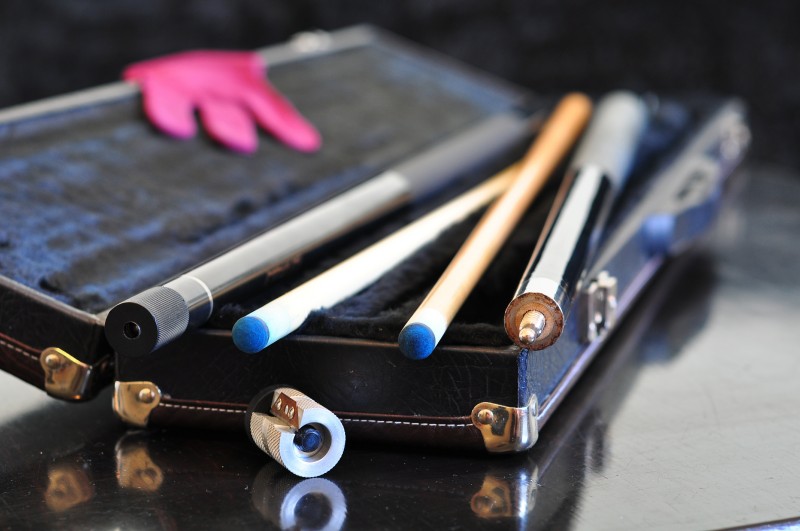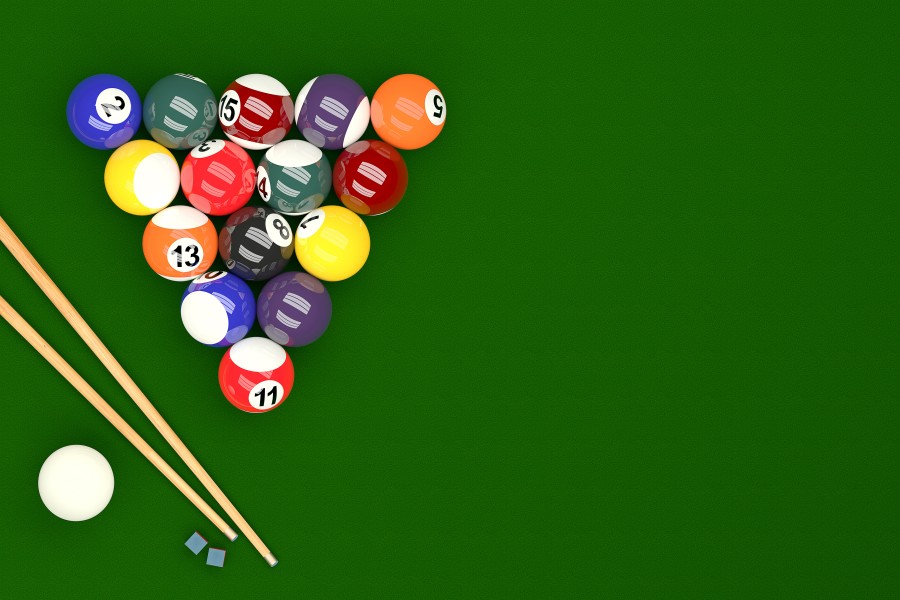Anatomy of a Pool Cue
When you delve into the world of pool, you quickly realize that not all cues are made equal. As a passionate pool table specialist, I often remind enthusiasts that a good game starts with understanding your equipment. And at the heart of that equipment lies the pool cue.
Tip, Ferrule, Shaft, and Butt: Understand the Components
Every pool cue comprises distinct parts, each playing a unique role in your game’s dynamics. By recognizing these, you ensure a better connection with your cue and, subsequently, a superior game.
- Tip: The point of contact between the cue and the ball. A well-maintained tip offers precision in every shot.
- Ferrule: Positioned right below the tip, this safeguards the cue from splitting due to regular impact.
- Shaft: This is the longer segment of the cue. A smooth, straight shaft ensures accurate shot delivery.
Then, we have the butt, the cue’s lower half. It’s crucial for grip and gives the pool cue its distinctive weight and balance. Familiarity with these components not only enhances your connection to the game but also offers insight when making future pool cue purchases.
Differences Between One-Piece and Two-Piece Cues
Choosing between one-piece and two-piece cues often comes down to personal preference and playing conditions. Here’s a quick comparison:
- One-Piece Cues: Typically found in pool halls, they provide consistency and are great for straight shots. They’re ideal if you’re looking for simplicity and tradition.
- Two-Piece Cues: These are more portable and often favoured by professional players. The join in the middle allows for ease of transport without compromising on performance.
Regardless of your choice, remember that a pool cue is an extension of your arm. Investing time in understanding its anatomy can drastically impact your gameplay. Whether you’re a seasoned player or just starting, grasping the nuances of your pool cue will set you on a path to master the game. And with the right knowledge and equipment, you’ll be more equipped to face any opponent across the pool table.
Factors to Consider When Buying a Pool Cue

Choosing the ideal pool cue for your game isn’t just about aesthetics or brand names. It’s about how that cue feels in your hand, how it complements your gameplay, and ultimately, how it boosts your confidence on the pool table. Over the years, I’ve noticed that players who take the time to find their perfect match often enjoy the game more and see a significant improvement in their performance.
Length and Weight: Tailoring to Your Play Style and Build
In my experience, a pool cue’s length and weight play pivotal roles in determining its suitability for a player. Just like shoes, there’s no one-size-fits-all when it comes to pool cues. The optimal length allows for a comfortable reach across the table without straining your arms or back. If you’re taller, you might lean towards a longer cue, whereas shorter players might find more control with something a bit more compact.
Weight, on the other hand, directly influences the force behind your shots. A heavier pool cue offers more power for break shots, while a lighter cue gives you better control for finesse shots. It’s imperative to hold different cues, try out varied weights, and identify what feels most comfortable and natural to you.
Materials and Craftsmanship: From Maple Wood to Fibreglass
The material of a pool cue can significantly affect its performance, lifespan, and even its look. Traditionalists often favour maple wood for its durability and classic appearance. It offers a solid feel and has been a staple in the pool world for generations.
However, newer materials like fibreglass or carbon fibre composites are gaining popularity. They promise increased durability, resistance to warping, and a unique feel in hand. It’s always worth trying cues made from different materials to gauge which resonates best with your playing style.
Price vs Quality: Investing in Durability and Performance
As with most things, you often get what you pay for with pool cues. However, that doesn’t mean you need to break the bank to find a quality cue. There are numerous high-quality cues available at reasonable prices, but it’s essential to strike a balance. Investing in a well-crafted pool cue can lead to years of enhanced play and enjoyment. Conversely, continuously replacing cheap, low-quality cues can end up costing more in the long run – both in terms of money and your gameplay.
In conclusion, understanding your needs, preferences, and budget is vital when choosing the perfect pool cue. By considering these factors, you’re setting yourself up for a richer and more rewarding experience at the pool table.
The Impact of the Cue on Gameplay

As someone deeply entrenched in the world of pool tables, I’ve witnessed firsthand the difference the right pool cue can make in a player’s game. From the novice to the professional, everyone benefits from a cue that resonates with their playing style. But why exactly does the cue hold such sway over gameplay?
Cue Balance and its Effect on Shots
Imagine a scale, with one side holding control and the other power. The balance of your pool cue acts as the fulcrum, influencing the weight distribution as you play. A cue’s balance determines how it feels when you hold and strike with it. Here are some general insights:
- Front-Heavy Cues: These often provide more power, especially suitable for break shots. The weight towards the tip can help players generate more force.
- Rear-Heavy Cues: Offering more control, they’re perfect for players aiming to improve precision, especially in tight spots or when attempting spin shots.
Understanding how balance affects shot delivery can aid in refining technique and improving overall gameplay.
Why a Good Pool Cue Can Enhance Your Skills
Over the years, I’ve had countless conversations with players who’ve felt an immediate change in their gameplay after switching cues. While skill is undoubtedly a significant factor, the right cue can accentuate those skills, making complex shots easier and more intuitive. Let’s break this down:
- Consistency: A high-quality pool cue ensures that shots are consistent. There’s a predictable response each time you strike the ball, leading to better strategy and planning.
- Feedback: Good cues provide tactile feedback. You can feel the shot, which helps in adjusting strength, angle, and spin for future strikes.
At its core, pool is a game of angles, physics, and precision. And while practice is vital, the equipment you use, specifically your pool cue, acts as a facilitator. It translates your intent into action on the table. When your cue is in harmony with your style, it becomes an extension of your arm, guiding the ball as you envisioned.
In essence, the pool cue’s impact on gameplay cannot be overstated. It bridges the gap between a player’s skill set and their performance on the table. As you continue your journey in the pool world, remember to give your cue the attention it deserves. It’s not just a stick – it’s your partner in every game, every shot, and every victory.
For Pool playing tips see playing pool.
Pool Cue Maintenance
One of the most overlooked aspects of owning a pool cue, surprisingly, isn’t how you play with it, but how you care for it. Your pool cue is an investment, a trusted companion in every game. Like any prized possession, regular maintenance ensures its longevity and, in turn, consistency in your gameplay. But what does proper pool cue care entail?
Regular Cleaning and Tip Replacement: Ensuring Longevity
Through countless games, chalk application, and hands-on contact, a pool cue collects dirt, oils, and residue. Over time, this build-up affects its performance and appearance. To keep your cue in top-notch condition, consider these simple steps:
- Cleaning: Use a slightly damp microfibre cloth to gently wipe down the shaft, removing any grime. For the butt, a simple wipe with a dry cloth will suffice. If necessary, specific cue cleaners can be used for deeper cleaning.
- Tip Maintenance: The tip of your pool cue undergoes the most wear and tear. Regularly check for signs of flattening or unevenness. A simple scuff or reshape might bring it back to life, but be prepared to replace the tip when it shows excessive wear.
These simple yet effective methods ensure your cue remains responsive, delivering consistent shots. Additionally, a well-maintained cue exudes professionalism, making you not just play the part but look it too.
Safe Storage Solutions: Protecting Your Cue from Warping
A common misconception I’ve encountered among players, especially newcomers, is underestimating the importance of proper cue storage. I can’t stress enough: A warped pool cue can drastically hinder your performance. To prevent this dreaded warp and other potential damage, follow these guidelines:
Always store your pool cue in a case when not in use. This protects it from environmental factors like humidity, which can be detrimental. For those with a two-piece cue, disassembling it before storage reduces stress on the joints. Moreover, always store your cue horizontally. Placing it vertically, especially without support, might seem like a space-saving idea, but it risks the cue bending over time.
In the world of pool, details matter. The minute adjustments you make, the hours of practice you put in, and yes, the care you offer to your pool cue. By ensuring its maintenance and proper storage, you’re not only preserving a piece of equipment but also safeguarding the quality of your game. After all, in a match where precision is everything, even the smallest factor can make the grandest difference.
Common Misconceptions About Pool Cues
During my tenure as a pool table specialist, I’ve often found myself debunking myths and misconceptions about pool cues. Many players, both newcomers and seasoned veterans, hold beliefs about cues that might not align with reality. Addressing these misconceptions is crucial not only for informed purchasing decisions but also for improving one’s game.
The More Expensive, The Better
One of the most prevalent myths is equating the price of a pool cue with its quality. While there’s some truth that premium cues come with a higher price tag due to craftsmanship and materials, it doesn’t mean every expensive cue is the best fit for you. Similarly, there are many mid-range cues that offer fantastic performance and durability. It’s essential to:
- Research: Understand what you’re paying for. Is it the brand name, the craftsmanship, or the materials used?
- Test: Whenever possible, test the cue before purchasing. An expensive cue might not necessarily align with your playing style.
What truly matters is how the cue feels in your hand and its synergy with your gameplay style, not its price tag.
Heavier Cues Deliver Powerful Shots
Another widespread belief is that a heavier cue automatically translates to more powerful shots. While a heavier cue can indeed generate more force, it’s not the sole determinant of a powerful shot. Technique, angle of strike, and cue balance also play pivotal roles. A player might find they have better control and generate sufficient power with a lighter cue. It’s all about finding the right balance that complements your style of play.
One Cue Fits All Game Types
Pool, billiards, and snooker, while similar, have distinct gameplay characteristics. Some players believe one cue can seamlessly transition between these games. In reality, cues are often tailored for specific games. For instance, snooker cues typically have smaller tips suitable for the smaller-sized balls, while pool cues are more varied, catering to the diverse styles of pool games. It’s crucial to pick a cue designed for the specific game you’re playing for optimal performance.
In conclusion, the world of pool cues, with its myriad choices, can sometimes be overwhelming. However, by debunking common misconceptions, players can make informed decisions and refine their gameplay. Remember, the right knowledge combined with the right equipment is the secret formula for pool table success.
Call IQ Pool Tables on 0161 494 8485 for table recovering services, game accessories and a wide range of new pool or snooker tables.
